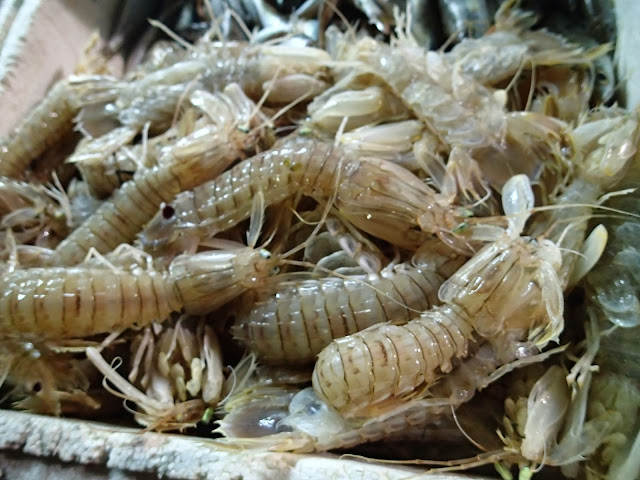Late October 2013
Drove out to Lefkada (about 5 1/2 hours from Athens). Beautiful day, magnificent countryside. Then you finally cross to the island on a causeway that leads to the small city next to a lagoon. The causeway crosses large wetland- lagoons with honking flamingos, venetian fortresses long-forgotten above the marshes. I took some pictures of this amazing wetland serenity - then I wore my tie, changed shoes and entered the workshop at the Cultural Center.
The workshop was about "smart specialization" focusing on regional economic development and the sea. My colleagues from HCMR, Drs. Aris Prospathopoulos and Kostas Kapiris did their best to express our ideas on how fisheries, conservation, ecotourism etc can contribute to "ecodevelopment". We learned a lot and met both politicians and consultants. Later I visited the trawlers in Lefkada harbour - mantis shrimps, hake, sardines and mollusks. We enjoyed a wonderful seafood dinner and lots of cold Greek beer next to the trawlers.
Incidentally, due to a mistake in my hotel reservation, I was turned away from the reception desk and asked to go to another hotel...the hotel was full! This is amazing, but really good news; this year was good for the tourism industry in Greece.
I really believe tourism if managed properly could help Greece recover. But it needs to be of a different variety - not the tourism we saw developing in former years. We propose more alternative tourism strategies - and we especially support ecotourism development. More education and special promotion facilities for this are needed. Tourism services need to be of a higher quality as well. Tourism needs a vision that will support and protect the natural heritage. And this kind of ecotourism requires bottom-up local support. And it must be strategically planned -focusing more on Nature. The unique nature of each part of the Ionian for example must be brought out, interpreted, promoted as a heritage. Its possible if we put our minds to it!
Here are some scattered examples of where I think scientists could support "eco-development" in practice - within a smart specialization framework:
- Monitor marine and coastal resources using smart technology and applications (produce new innovating means to do this).
- Promote and better enforce wise fisheries use; better monitor stocks, explore new harvest methods; stop catastrophic and wasteful overfishing or unchecked fishing techniques; integrate forces to end the stocks destruction.
- Help "restore stocks"; its not enough to monitor we must apply our developing knowledge.
- Help better monitor, assess and remedy fisheries conflicts with wildlife (turtles and dolphins are a local problem).
- Promote tourism development focusing on special clusters such as ecotourism inovations.
- Help build facilities that interpret nature and promote it - I really believe Greece could have at least 5 big world-class aquarims (In Lefkada why not an..."Aquarium of the Ionian"). The lack of functioning nature interpretation facilities, education materials etc is striking in Greece.
- Educate and train locals; one important aspect is training eco-guides (certification also). We need to upgrade the "nature and culture experience" of visitors, so we need knowledgeable guides.
- Plan, apply and help monitor new recreational - education ventures such as diving tourism (Dive parks they are called in Greece - these are specially designated sites where great diving is promoted).
- Marine strategy and Water Framework Directive approaches (policy-relevant applications supported by industry).
- Making some industrial developments less costly to the enviroment - better fish farm practices.
-Coastal zone management; espeically "small wetland" conservation, restoration, habitat enhancement and educational development (e.g. wildlife watching etc).
- "Eco-development" within and near the protected areas of the Ionian (Natura 2000 sites); organize to develop recreation without degrading the environment (walking, eductional tourism, snorkeling, boat trips, kayaking, biking, birding, conferences, biological statiosn, field schools, summer schools etc).
-Manage protected-areas (the Natura 2000 sites) effectively and sustainably; and bring culture in. There are many ways to do this, especially through eduction and eco-promotion. Bring out the "nature-identity" of each island in the Ionian....
We need to bring scientists closer to development and economy at the local and regional level - it is possible to make a difference.

















